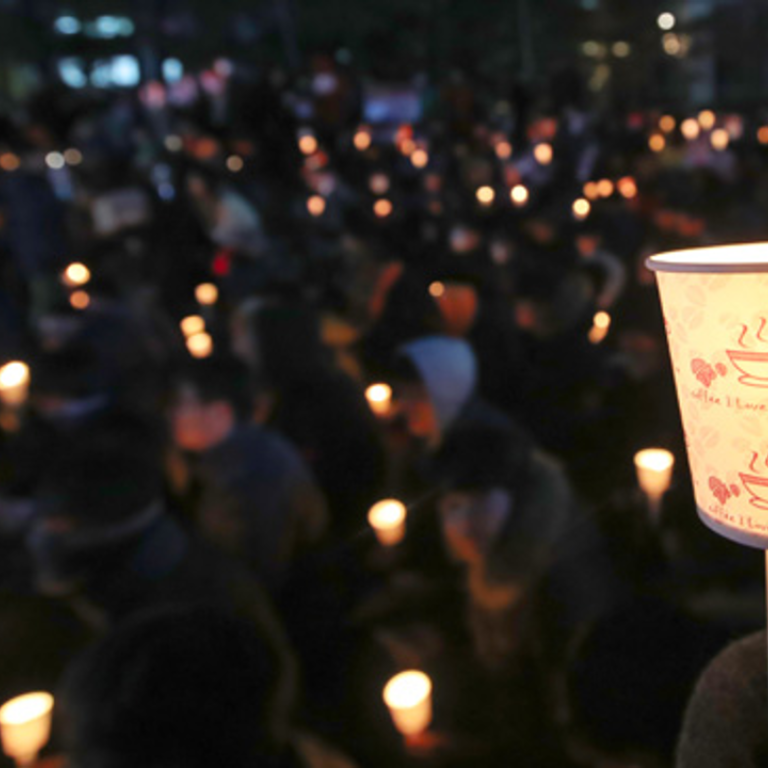
Things non-Koreans need to know at anti-President Park rallies
‘There are some articles in law that in principle prohibit foreigners from attending rallies,’ says legal counsel
By Jon Dunbar
Foreigners participating in the protests against President Park Geun-hye may carry legal complications ― theoretically.
“As legal counsel I would say not to go to the rallies, as there are some articles in law that in principle prohibit foreigners from attending rallies,” said Nam Won-chul, a lawyer with Hwang Mok Park law firm.
According to the Immigration Control Act, “No foreigner sojourning in the Republic of Korea shall engage in any political activity with the exception of cases provided by this Act or other statutes.” The act empowers the Ministry of Justice to order a violator “in writing to suspend such activity” or “take other necessary measures.”
This may include deportation or a ban on visa renewal, according to one source familiar with the matter.
The law applies to all foreigners regardless of visa type, Nam says. “According to the text of the article, I think all foreigners are uniformly prohibited from political activities.”
Hwang Pill-kyu, a lawyer affiliated with GongGam Human Rights Law Foundation and Minbyun, a social organization of progressive lawyers, echoes Nam.
Hwang, who works with migrant worker groups, says, “If it’s for their own rights, there won’t be any problems.”
But domestic political protests are different, he says, citing a human rights committee session in 2005. “The government position is joining political parties and direct participation is illegal, but having assembly is okay.”
Many foreigners sighted at rallies may not have intended to join in. This happened to Evan, an Australian who wished to hide his identity. “I accidentally found myself in a protest a year back after a police checkpoint funnelled me into the heart of it whilst trying to pass around it to Seochon,” he said.
Nam and Hwang agree Evan was not in legal danger.
“If their intention was not like picketing and going to rallies, it would not be a problem,” Nam said.
Evan has attended more recent protests out of curiosity and to raise international awareness. He said he refrains from active participation, “partly out of fear of legal repercussions and partly because I feel I don’t have a full stake in the outcome and question whether my presence would be welcomed.”
According to Hwang, this activity is legally acceptable, though police may challenge it.
Foreigners who are confronted or detained by police should state their intention was not to actively participate, that their presence was unintended, Nam advises.
As well, foreigners at rallies should be careful speaking to journalists and sharing on social media. They could be prosecuted if they are quoted in media reports. “If it shows he or she attended the rallies, it would be evidence for the government,” said Nam.
But foreigners are protected for social media activity, according to Nam, which includes sharing political statements and pictures taken at rallies. “Although the posting activity might be interpreted as a political activity,” said Nam, “I think it would be a hard task for the government to clearly prove political intention.”
Hwang is more cautious about oversharing evidence of attendance or participation on social media. But posting opinions is safe, he says. “Police could say it’s a political activity, but I would say it’s just a comment and anyone can comment on Trump, Kim Jong-un, Park Geun-hye,” he said, “Preventing political activities doesn’t mean preventing expression of political thoughts.”
The Constitutional Court ultimately decides whether citizens’ rights ― such as the right to assembly ― are extended to foreigners, according to Nam. “As the Constitutional Court is getting more conservative, I think the right to attend political rallies will just be a national citizens’ right,” he said.
But Evan sees little problem in attending upcoming protests. “I find it hard to imagine police targeting foreigners actively,” he said. “Particularly in this case, where the public is overwhelmingly in support, it is a statistical unlikelihood that anyone with the power to target foreigners would be motivated to.”
According to Nam, the police hold the deciding power. “It’s always up to the discretion of the police department,” he said. “There are no precedents of police arresting foreigners for attending rallies but there is still the possibility the police department may do something.”
When contacted, the Seoul Police public relations office was unaware of any foreigners being arrested for attending the ongoing rallies.

